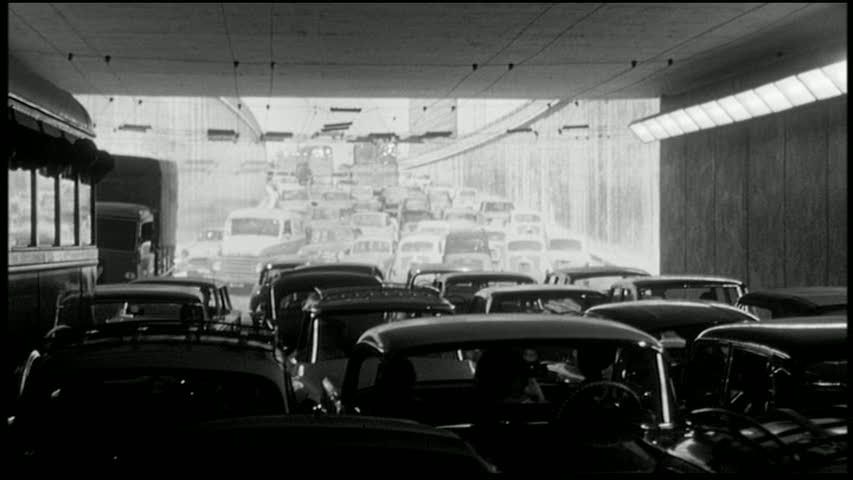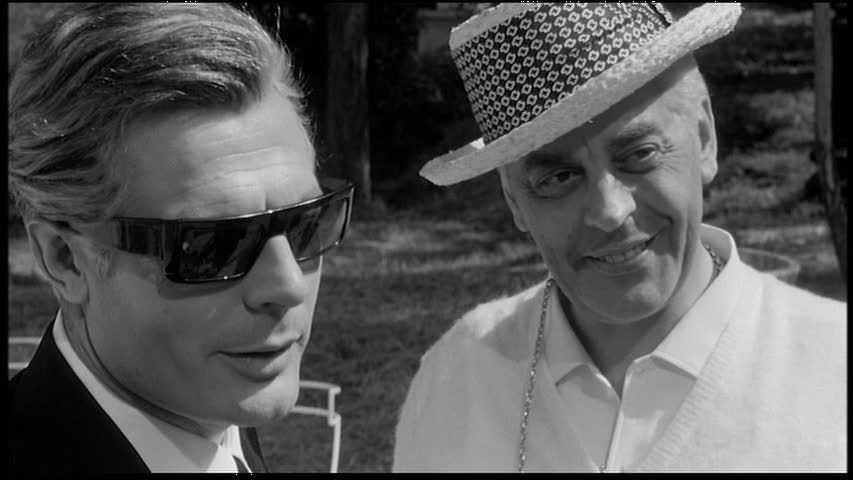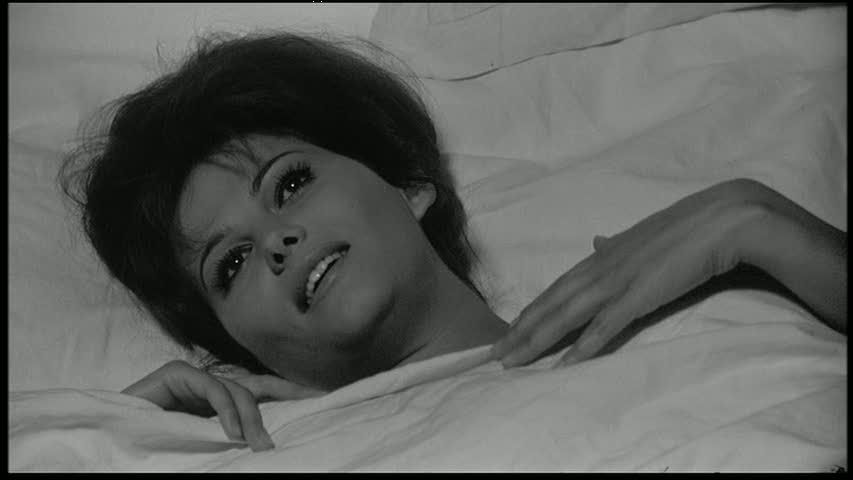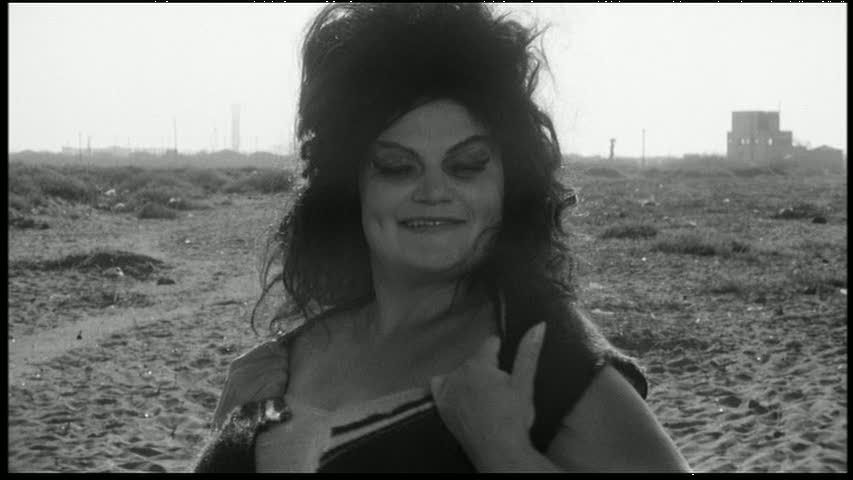
Federico Fellini's 8 1/2 transforms the director's preoccupation with his own creative difficulties and his tangled relationships with women into a wild film where fantasy and reality blend together seamlessly. Fellini's stand-in, the director Guido Anselmi (Marcello Mastroianni), is having problems making his next picture. He's out of ideas even though sets are being constructed and the characters are being cast, and his attempt to relax and focus on his work at a remote spa is sabotaged by the frenzied circus atmosphere that inevitably develops around him wherever he goes. He's surrounded by producers, writers, advisors, actors and actresses, as well as both his wife Luisa (Anouk Aimée) and his lover Carla (Sandra Milo). Guido retreats into dreams, and increasingly hangs all his hopes on impossible fantasies regarding the actress Claudia (Claudia Cardinale), who he hopes will resolve his many problems once she finally arrives; he imagines her as a pure, calm, angelic presence who will be able to quiet his busy life.
In the meantime, Fellini packs the film with Guido's fantasies, dreams and nightmares, many of them loosely based on Fellini's own experiences, and all of it propelled by the jaunty music of Fellini's frequent composer Nino Rota. There's certainly no missing Fellini's own nostalgia in the film's most iconic sequence, the boyhood reminiscence of the grotesque Saraghina (Eddra Gale), a powerful mountain of a wild woman with legs like tree trunks. Outside her beachside hovel, she teases and dances for the young boys of the town. Fellini presents this memory with the force of a defining moment, an experience that contributed to the formation of the impressionable young Guido's sexual identity. Scenes like this — or Guido's surreal dream about his parents or his extended fantasy about a harem of women kept in line with a whip — are charged with Fellini's unique, hyper-real aesthetic, in which dreams and illusions have as much presence and physicality as Guido's reality.


















I'VE NEVER SEEN THIS!! I know, I know. I own it, but I've never seen it. I want to knock off a couple more earlier Fellini before I tackle 8 1/2.
ReplyDeleteWell of course we have here one of the supreme masterpieces of cinema (and a title that seems to be doing spectacularly well in our site's 60's poll, unsurprisingly) and I am hardly throw for a loop with Ed's profession passion, not his economically eloquent case for it here in this capsule. Ed rightly poses that in this magical world of Italy's master showman, dreams and illusions have as much physicality as what is real, and acknowledges the incalcuable contribution of one of the greatest of film composers, Nino Rota. It's a film for the ages.
ReplyDeleteBill, it's obviously essential. I actually haven't seen as much Fellini as I probably should, but I don't think an understanding of his early work is really necessary to enjoy this film. More than anything, it's just so much fun.
ReplyDeleteAnd thanks, Sam.
God, my typos are terrible, and I apologize for this.
ReplyDelete"throw" should be "thrown"
"profession" should be "professed"
"not" should be "nor"
Par for the course. Ugh. I will be careful to proof read in the future to avoid this.
Watching this with my girlfriend was one of those unforgettable experiences--- God, how she hated it. It really is one of those movies.
ReplyDeleteI do love 8 1/2, Fellini's imagery is just alive with energy and swimming with romance, but you definitely feel the man's self absorption with this picture. Truthfully, I like the film as much for being 8 1/2 as I do for the fact that it inspired one of my favorite films, Fosse's All That Jazz, and one of my favorite Allen's, the hilarious Stardust Memories where Allen general feeling.
But I remember watching this at the beginning of college, and it really showed me how images can communicate. I still have much more Fellini to catch up on.
Whoah, I forgot the rest of that sentence:
ReplyDelete*where Allen captured the general feeling of Fellini's film.
Or something like that.
The other essential Fellinis, Ryan,in fear of sounding like like pompous know at all (but in truth just enthusiastic with Ed's great review here and the follow-up discussion) in my view are:
ReplyDeleteLa Dolce Vita
I Vitelloni
Nights of Cabiria
La Strada
The White Shiek
Juliet of the Spirits
Amarcord
Il Bidone
Satyricon
Watching this with my girlfriend was one of those unforgettable experiences--- God, how she hated it. It really is one of those movies.
ReplyDeleteOr maybe you just need another girlfriend. I'm just saying.
I don't know, Greg, it can be fun to watch a movie and strongly disagree about it. Anyway, it's not hard to see why Fellini's ode to self-obsession would have a polarizing effect. I would also imagine that many women would see it from quite a different perspective from us guys.
ReplyDeleteAnd Ryan, I agree with you about Stardust Memories, which I love for its Fellini homage.
I've watched this movie only one time, I must admit, and I did really like it... it's a film that I honestly could just mute (or I should say turn off subtitles!) because it really is so much fun to just watch. It's rare that I say that about a film.
ReplyDeleteIs it abnormal to like 8 1/2 but have very little positive reaction to La Dolce Vita?
Well I'm not shy about the fact that I think this is the greatest film ever made. It's so amazingly acute in what a film needs in order to be successful: aesthetics and narrative. I've seen the film countless time now, and the narrative becomes richer upon subsequent viewings.
ReplyDeleteI'm glad you threw the still up there of Guido drenched in black as he is riding in the car with his dream girl. It's one of my favorite scenes of the film.
This is my selection for TOERIFC for next May -- so Bill if you don't see it by then, that will give you a chance to.
I highly recommend Sam's list to those that haven't seen a lot of Fellini, because like Sam (at least by the looks of his list) I much prefer the postmodern and visionary Fellini to the neo-realist Fellini (anything pre-La Dolce Vita).
Great stuff here Ed. I can't wait to talk about this film in more depth at a later time (a whole year away!).
Dave, I don't know if it's abnormal, but I love La Dolce Vita only slightly less than this film. It's definitely a more "difficult" film, a little colder, a little sadder, a little less energetic. But still a masterpiece.
ReplyDeleteKevin, I just recently saw that you'd picked this film for TOERIFC, and I'm looking forward to it. It's a great choice. I also agree with you (and presumably Sam) that Fellini's best work is not his neo-realist period. I admire those films, but it's his later carnivalesque films that I really love.
Yes, Ed, I am with you and Kevin on the preference here. I also greatly look forward to Kevin's TOERIFC submission.
ReplyDelete8 1/2 has indeed got to be one of the most celebrated movies ever - doesn't matter if you love it or hate it. Further, of all the movies formally recognised as 'masterpieces' by all and sundry, this might just be one of the most difficult for a layman, or even a cinephile, to sit through and enjoy. But anyone with a modicum of what one might call CQ (cinema quotient) would be in awe of it - for its complex psychological explorations, its delirious narrative, its apparently freewheeling nature, its surreal montages, its redefinition of movie jargon (like perhaps Breathless) et al. A daunting movie for amateurs I must say, but also one that one wouldn't forget very easily.
ReplyDeleteEd:
ReplyDeleteCarnivalesque is such a great way to put it. It's especially apt since Fellini was so indebted to the carnival lifestyle (the obvious example here is La Strada). The ending encapsulates that carnivalesque feeling well as all of the people from his life come together in what is somewhat an anti-Bergman's The Seventh Seal moment where they circle around for a dance of life. It's an exhilarating, celebratory moment that never fails to make me smile.
I often hear about how this movie is more difficult than other canonical art films, but I just don't understand that at all. The first time I saw it I just found it a ridiculously fun movie.
ReplyDeleteShubhajit: I think I agree more with Krauthammer that this film isn't really so difficult to appreciate no matter what one's level of comfort with art film is. I can see various reasons why some wouldn't -- the self-absortion, the perspective on women -- but on the whole it's just such a fun, exciting film that I find myself caught up in its atmosphere every time I watch it. There are plenty of accepted cinematic masterpieces that would be intimidating or difficult in various ways, like a lot of Bergman or Antonioni. But 8 1/2 is just a blast to watch, and it doesn't take any real deep engagement with the film or with cinema in general to appreciate the beauty of the images, the wonderfully bouncy Rota score, or the frequent humor. As I said above, I think La Dolce Vita can be a lot harder to get into on its surface.
ReplyDeleteKevin: Great (and counterintuitive) linkage to the end of The Seventh Seal. Fellini's ending is like a dance of life rather than death, celebratory despite the main character's many travails.
"I don't know, Greg, it can be fun to watch a movie and strongly disagree about it. Anyway, it's not hard to see why Fellini's ode to self-obsession would have a polarizing effect. I would also imagine that many women would see it from quite a different perspective from us guys."
ReplyDeleteI'm sure Fellini thought the same thing, which is why he made Juliet of the Spirits next, right? both are in my favorite films of all time, 8 1/2 is probably still first if I really had to choose.
Oh yeah, I'm sure Fellini was very self-aware about that stuff, and even in 8 1/2 he seems to be partly mocking Guido's (and his own) self-obsession and problems with women. I love Juliet of the Spirits too.
ReplyDeleteWhat an opportune time to discuss this film, given the upcoming release of Rob Marshall's Nine. I can't wait for the eventual musical variations of L'Avventura and The Seventh Seal!
ReplyDeleteWhen I first watched 8 1/2, I was bored from beginning to end. After viewing it, however, and occupying my mind with other things, it popped back in my head in a way that somehow "clicked." A metaphor would be a recipe where the ingredients have to "simmer" properly.
ReplyDeleteSince then it's been one of my faves. And I agree that it isn't pretentious; it's actually playful, from some of the cartoony, onemonepeic language to Fellini's sensual, flowing camerawork. In fact, people who think older Foreign films are static and stagy should treat themselves to this movie, which has a dynamism and visual energy most Hollywood directors would kill for.
Thanks for chiming in Seejaye, it's good to hear the perspective of someone for whom this film didn't "click" immediately. I'm also agreed about the energy of Fellini's filmmaking, a big part of his appeal for me. I also love the pattering dialogue between Guido and Carla, which comes across like comic book sound effects.
ReplyDeleteFinally returning to this. Thanks for the response, Ed. And J. Nyhuis, lol at your ideas for musicals! But it turns out that Bergmann has been made into at least one musical: Smiles of a Summer Night became "A Little Night Music" on Broadway. Actually, it's one of Bergmann's lighter films - considered a "comedy" - adapted by one of Broadways "darker" composers, Stephen Sondheim, so it's not too incongruous.
ReplyDeleteFellini's Nights of Cabiria was made into "Sweet Charity" with Shirley MacClaine.
Oh, and I'm seejaye, btw
ReplyDeleteHey Cameron, thanks for stopping back by. The idea of a Bergman musical is definitely funny, though Smiles of a Summer Night makes some sense; it's easily adapted into a light comedy, as Woody Allen proved by mingling it with Shakespeare for A Midsummer Night's Sex Comedy. Now Persona: The Musical, that would be something to see!
ReplyDeleteThis comment has been removed by the author.
ReplyDelete